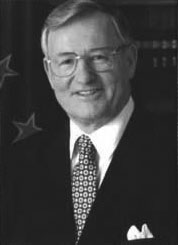Jim Bolger

The Rt Hon Jim Bolger led the National Party for almost 12 years and had three consecutive terms as the country's head of government.
Under his leadership the New Zealand economy was transformed from having the lowest growth rate among the 29 OECD nations, to today having one of the strongest.
New Zealand is now recognised as being among the most open and competitive economies in the world.
Mr Bolger's administration pursued an outward-looking foreign policy to strengthen New Zealand's relationships with other countries, especially in the Asia/Pacific region.
In particular New Zealand is active in international peacekeeping and at the United Nations. From 1992-1994 New Zealand was a member of the Security Council.
Mr Bolger chaired the Commonwealth Heads of Government (CHOGM) meeting in New Zealand during 1995 and has taken a leading role in the international debate on nuclear disarmament, particularly in the Pacific region.
He has represented New Zealand at each of the five Asia Pacific Economic Cooperation (APEC) Leaders' summits since the original meeting in Seattle in 1993.
Mr Bolger was born in Taranaki on 31 May 1935. He was a beef and sheep farmer, and active in farming organisations before entering national politics in 1972 when he was elected Member of Parliament for King Country, a seat he held for nine elections.
In 1975 he became a Parliamentary Under-secretary and in 1977 he became New Zealand's first Minister of Fisheries and Associate Minister of Agriculture. During this time he was engaged in international negotiations associated with New Zealand's move to declare a 200 mile Exclusive Economic Zone.
Following the 1978 General Election, Mr Bolger was appointed Minister of Labour and Minister of Immigration. During this period he introduced many important legislative changes, including laws permitting weekend shopping and voluntary unionism, Mr Bolger was elected President of the International Labour Organisation in 1983.
Following the National Party's defeat in the July 1984 General Election, Mr Bolger was elected Deputy Leader of the Opposition in November of that year, and in March 1986 he became Leader of the National Party and Leader of the Opposition.
In October 1990 he led the National Party to the biggest electoral victory in New Zealand's history and started to implement far reaching changes in New Zealand's economic and social policies.
In the November 1993 General Election the Bolger-led National Party was again returned to power.
Following the October 1996 General Election, which marked a shift in New Zealand's electoral process from that of "first past the post" to a MMP (mixed-member proportional) system, Mr Bolger formed a Coalition Government with the New Zealand First Party.
In December 1997 Mr Bolger retired as Prime Minister and Leader of the National Party, and was appointed Minister of State and Associate Minister of Foreign Affairs and Trade (with special responsibility for APEC).
In 1998 Mr Bolger was appointed New Zealand Ambassador to Washington and he resigned as a Member of Parliament in March 1998.
In his youth Mr Bolger was a keen rugby and cricket player. Today he lists part-time farming, watching sport (especially rugby), fishing, tramping and reading as his pastimes.
Mr Bolger and his wife Joan have nine children and four grandchildren.
Document Actions

 Like us on Facebook
Like us on Facebook